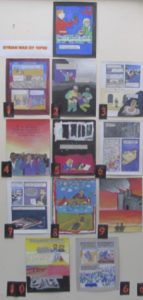Countesthorpe Academy promotes to all the importance of democratic rights, the responsibilities that come with these rights and the need to show respect and tolerance of others.
The academy is committed to serving its community and accepts admissions from all those entitled to an education under British law, including students of all faiths and none. The academy's Equality and Diversity Policy guarantees that there will be no discrimination against any individual or group, regardless of faith, ethnicity, gender, sexuality, political or financial status, or similar. It seeks to serve all with a broad and balanced curriculum and offers students many opportunities to learn about others’ views and how to be tolerant.
The Government emphasises that schools are required to ensure that key ‘British Values’ are taught in all UK schools. The government set out its definition of British values in the ‘Prevent Strategy’ – values of:
- democracy
- the rule of law
- individual liberty
- mutual respect
- tolerance of those of different faiths and beliefs.
The academy uses strategies within the National curriculum and beyond to secure such outcomes for pupils. Some examples of when British values are shared:
Curriculum themes and topics
The academy's curriculum prepares students for life in British Society. This includes developing the understanding and use of money, effective reading and writing skills, collaboration and discussion to research ideas and concepts. Curriculum themes include historical and geographical study in the context of the United Kingdom as well as national and international comparisons.
PSHCE
Mutual respect is taught within formal PSHCE and RE lessons and on an informal nature throughout the school day. Students are encouraged to know, understand and exercise their rights and personal freedoms and advised how to exercise these safely, for example through the E-Safety policy and PSHE work on keeping themselves safe. Through the PSHE and Citizenship programme, students learn about different political ideologies and are encouraged to develop their understanding through research, questioning, presentations and debate. All Year 10 students study a short course GCSE in RE where Christianity is explored in the context of philosophical and ethical questions. Students make active contributions to discussions and explore differing views.
Examples of Promoting British Values: Specific Tutorials and Tutor Group Projects
Bullying
All students start the year with a focus on the positive learning climate that the academy seeks to nurture. Students look at types of bullying and the importance of respect for other people. Reasons why bullying might occur are considered, ways to prevent and challenge bullying behaviour and why it is important to maintain a school community which respects each individual.
RE
Tolerance of those of different faiths and beliefs is promoted in RE as students gain a greater understanding of religious diversity and practices for those religions represented in the UK.
PE
Promotion of the concept of “fair play”, following and developing rules, celebrating and rewarding success, accepting defeat and participating in activities that promote cooperation with others and inclusion for all form an integral part of the PE curriculum.
Student Council
The academy promotes democratic processes through the School Council. This fosters the concept of freedom of speech and group action to address need and concerns. At the start of Year 7, students consider the role of a school council, the past work of the student council, and what makes a good class representative. Each House elects representatives who attend council meetings. The Student Council meets once every two weeks at lunch time. We have an active and engaged council who work on a different project each year.
Global Events
Issues such as democracy, the right to education, justice around the world and gender equality are studied. We react to global events and seek to provide up to date topics which reflect the world and times we live in.
Charity Week
The academy is linked to the charity ‘Volunteer Africa, 32° South’ and has raised money in annual Charity Weeks since 2011. In October 2018, £3276.08 was raised by our charity fayre involving activities such as cake sales, competitions, sideshows and sponsored events. The charity sends regular updates so that students can see exactly where their donations go, and this encourages a sense of responsibility and partnership. The charity week itself encourages community spirit, enterprise and teamwork. It encourages students to accept responsibility for their behaviour, show initiative, and to understand how they can contribute positively to the lives of those living and working in the global society.
Community Events
We seek to play an active part in our local community and in 2018-19 have taken part in local events such:
- Leicestershire Youth Crime Summit
- Blaby District Youth Conference
- Christmas lunch for the local elderly community
Citizenship Projects
The Citizenship Liaison Projects are organised and run in conjunction with the family of schools. These projects build community cohesion across the family of schools. In 2018-19 the project is entitled ‘Respect’ and comprises of areas such as:
- Tolerance and fighting prejudice
- The language we use, how language can offend and the language of respect
- Anti-social behaviour and how to challenge it
- Knife crime, causes, effects and solutions?
- Respect for the environment- saving the planet
In Y13, students undertake a research project on topical areas such as: Crime, punishment and reducing the prison population; Energy issues and environmental concerns; and Britishness. They present their work to SLT and the rest of their year group in a formal presentation.
Politics, Crime, Justice and Society Units
These units consist of a range of lessons which seek to enable students to distinguish right from wrong and to respect the civil and criminal law of England. The units encourage respect for democracy and support for participation in the democratic processes, including respect for the basis on which the law is made and applied in England. We study areas including:
- Civil and criminal law
- The justice system
- Forms of punishment
- Anti-social behaviour
- Democracy
- Internet culture
- Fake news
- Brexit
Positive Attitudes Unit
This unit helps students to develop their self-knowledge, self-esteem and self-confidence by focusing on the importance of emotional wellbeing, and how to cope with stress and depression. The unit also looks at prejudice and discrimination, with a particular focus on Islamophobia. It encourages tolerance and harmony between different cultural traditions by enabling students to acquire an appreciation of and respect for their own and other cultures.
Anti-extremism and One World
We study radicalisation and extremism in Y10, 11 and 12, using the Leicester City Council’s Respect resources for some of the lessons. We also look at concepts of Britishness in the Y8 Belonging unit. In the Y7 One World unit, students look at: the global community; the experiences of children around the world including child soldiers, the role of UNICEF and the UN Rights of the Child; and wants, needs and the distribution of wealth.
Careers Education
Careers Education across the year groups encourages high aspirations, promotes the importance of a strong work ethic and equips students with the skills to perform well at job interviews and on CVs.

